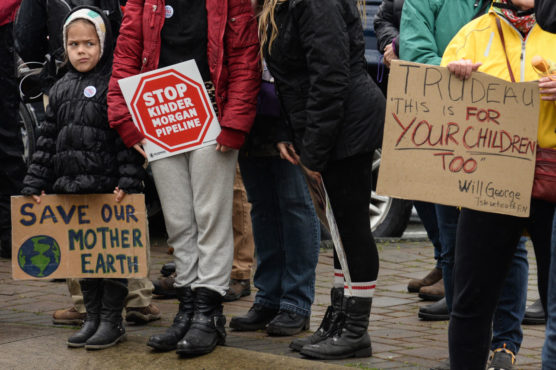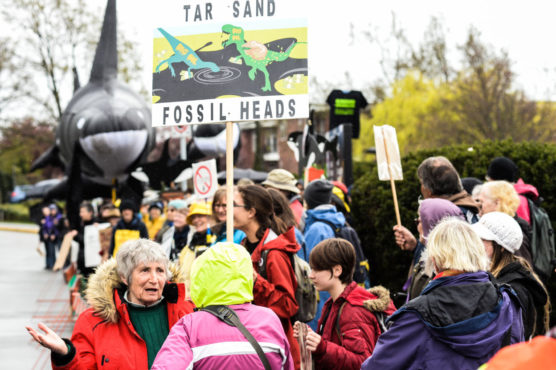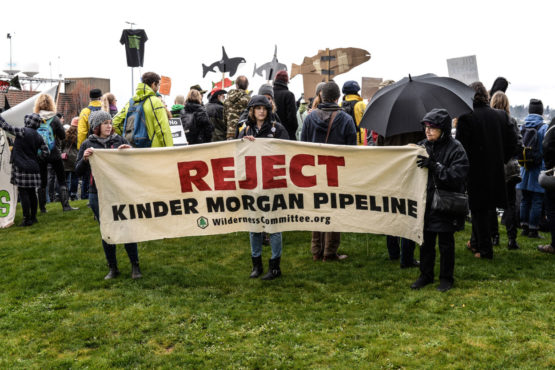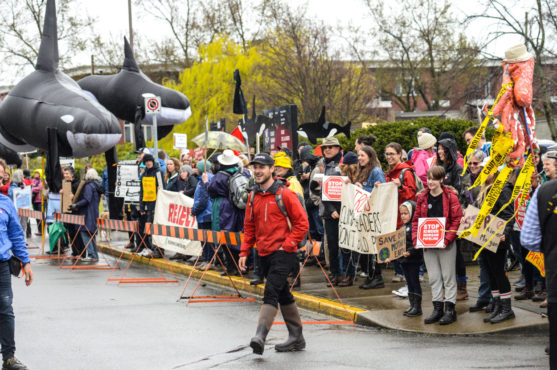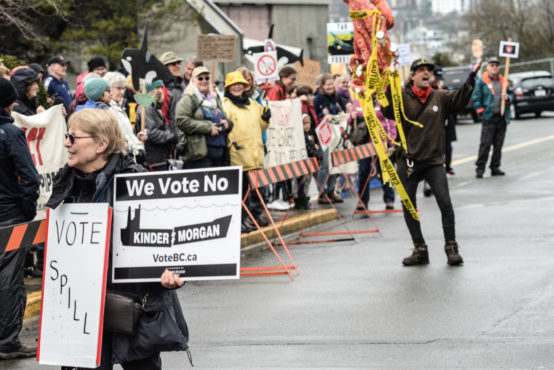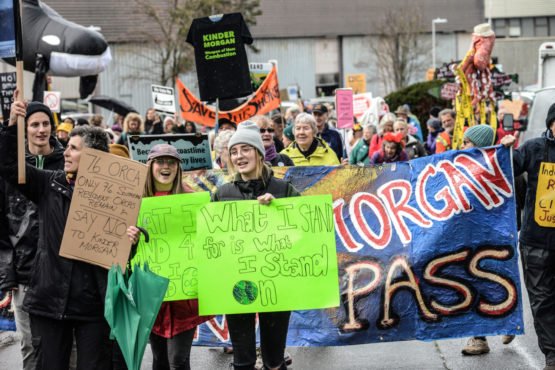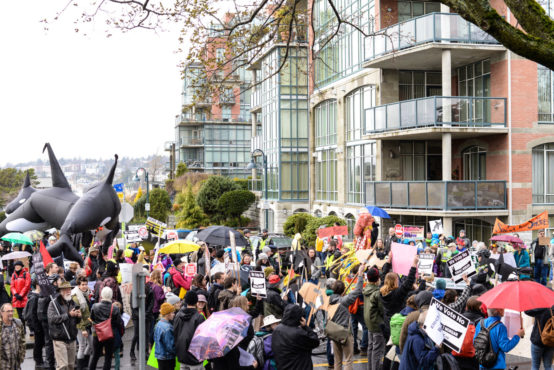Trudeau gets a gritty greeting from concerned Salish Sea residents at Kinder Morgan protest
The rain wasn’t the only cause for a cold welcome to Prime Minister Justin Trudeau on April 5 as he and his security entourage made their entrance into the Canadian Coast Guard Base in James Bay, Victoria, for a visit and press conference regarding the Trans Mountain pipeline expansion and the marine safety response plan.
Around 300 water protectors and defenders of Indigenous rights waited in the downpour for nearly two hours until Trudeau finally made a tardy arrival at approximately 3:10 p.m.
“The Prime Minister was close to an hour late to this media stunt,” said Torrance Coste, environmental campaigner with the Wilderness Committee.
“I hope spill response is quicker,” he added, tongue in cheek.
Coste had heard about the Prime Minister’s unadvertised visit by accident during a CBC interview 20 hours earlier, and he quickly set to work mobilizing Victoria citizens to attend the rally, protesting in part the risks posed by the Trans Mountain Pipeline Expansion Project approved by Trudeau that will increase oil tanker traffic through the Salish Sea by 700 per cent.
Those there primarily came to express their opposition to Trudeau’s decision to give the go-ahead for the pipeline expansion, believing it neglects Indigenous rights and reconciliation, the safety of the marine environment, and the need to start curbing rather than expanding carbon emissions.
The demonstrators came equipped with provocative signs, booming chants, and sea creature props (including a paper mache octopus wrapped in caution tape), to make sure their messages didn’t sail in one of Trudeau’s ears and out the other.
“This is just the beginning of an unstoppable wave of resistance that this Prime Minister faces if he continues to force this pipeline through Indigenous territories without their consent,” said Coste. “He got a little appetizer of that here on unceded Lkwungen territories.”
In attendance was James Smith, a Ma’amtagila youth from the Kwakwaka’wakw First Nation who lives in Alert Bay. Coste handed his megaphone over to Smith as the rally was just beginning.
“Trudeau does not care about Indigenous people. Trudeau does not care about B.C. He does not care about us,” Smith told the crowd. “He’s poisoning our waters, poisoning the animals, and he’s poisoning us.”
“Are you angry?” he asked the raucous crowd. “We’re going to tell Trudeau that. No more pipelines. No more oil being shipped off our coast in unsafe tankers spilling ‘liberally’ into our waters.” The pun was met by a wave of laughter and cheers of support.
“They kind of portray people opposed to the pipeline as being radicals,” said Emily Thiessen, a pioneering organizer of the Divest UVic club and anthropology undergraduate student at UVic. “But what’s really the completely radical, ridiculous thing is the idea that they can build this pipeline and continue to boycott catastrophic climate change.”
“I want to stand up for what I believe in.”
Making sure the Prime Minister didn’t sneak in unnoticed, the crowd moved from where they had gathered at the front entrance of the base on Huron Street and began blocking traffic on Dallas Road at 2:25 p.m.
By the time Trudeau’s motorcade pulled around the corner at the main entrance of the coast guard base, a great majority of the crowd had moved to the back entrance. Those back at the other entrance began running towards the main entrance, yelling, chanting, and flooding the street.
The convoy stopped, and Trudeau emerged from one of the black vehicles, waving and attempting to shake people’s hands.
“The contrast between how we were yelling and how Trudeau was smiling and waving as if he was walking through a different universe was very surreal,” Thiessen said, “and it was symbolic of the political situation we’re in.
“It wouldn’t have killed him to say ‘I hear your concerns’ or something.”
One of people who accepted a Trudeau handshake was Victoria City Councillor Jeremy Loveday. As he looked the Prime Minister in the eye, Loveday said, “Climate leaders don’t build pipelines.”
Trudeau entered the base and the rallying crowd was left on the sidelines to watch Trudeau tour the base on the other side of a barbed wire fence.
“I want to stand up for what I believe in,” said Kelly Barbin, a concerned mother of three and resident of the Salish Sea who had braved the rain for the welcome party.
In Barbin’s hand was a rope attached to a verging-on-life-sized orca whale. Two more orcas floated over the crowd appearing to swim as their helium balances fluctuated. Barbin’s orca was named “L41.”
“All three of these whales represent living local orcas,” she said, “and there’s only 76 [southern resident orcas] so you know we don’t have any more time, we have to protect all of them.”
A number of people at the rally were wearing shirts with Greenpeace facts about the pipeline risks, facts about Kinder Morgan’s 81 pipeline spills since 1961—more than one a year—and the fact that $9.7 billion of Canada’s GDP is supported by jobs and livelihoods related to a functional coastline.
Twenty-nine years after the Exxon Valdez oil spill, the Alaskan orca pod still hasn’t recovered, and none of them have reproduced.
Inside the base, Trudeau spoke to a much calmer crowd, made up of coast guard staff and media.
“A 167 million dollars is going directly towards the protection of endangered marine mammal populations in Canada,” he said on a CHEK News broadcast of the event, speaking about a component of the Federal Government’s $1.5-billion marine safety plan, the Oceans Protection Plan.
“One of the reasons we were elected was because Canadians were fed up after a decade of environmental neglect,” he told the press, referring to the policies of the Harper government.
But given the widespread opposition to the Kinder Morgan pipeline expansion approved by Trudeau in Nov. 2016, many feel that that neglect hasn’t gone away.
“It’s the height of irresponsibility bordering on the Harper government,” said Coste to the crowd, saying that the sole purpose of the pipeline “is to expand the most polluting industry in this country with no plans to meet our 2020 or our 2030 climate targets.”
The Greenpeace “No Kinder-Morgan” T-shirts demonstrators were wearing estimated a 9.4 billion dollar price tag to “clean up” a diluted bitumen spill in Vancouver. But because bitumen sinks and mixes with ocean sediments, there is doubt as to whether it can truly be cleaned up.
The first ever major diluted bitumen spill happened in a tributary of the Kalamazoo River, Mich., in 2010. The Tyee called it a “Spill from Hell,” as 200 acres of riverbottom were affected by the submerged oil and 60 per cent of local residents had symptoms from the toxic fumes that evaporated off the surface.
EcoWatch says there have been no major breakthroughs in clean-up technology since that fateful spill.
In the coast guard base, when asked about whether there is sufficient knowledge about bitumen to be able to clean it up in an ocean environment, the Prime Minister answered that so far after three decades of transporting bitumen through the Salish Sea, there’s been no problem.
Audrey Linda Marie Ignacz, in grade eight at Rockheights Middle School, came to the rally with her younger sister, her mom, and her grandmother. “I’m here to help our coast stop the Kinder Morgan pipeline transportation with horrible Justin Trudeau,” she said.
This was Audrey and her sister’s first protest, but the two of them held their protest signs with such sass that they seemed like seasoned demonstrators.
“It will make our earth ten times worse than it already is,” she said.
During the press conference, Trudeau failed to bring up the Indigenous rights issues at play, nor did he acknowledge the Lkwungen-speaking peoples whose territories he was visiting. He did say that Victoria and the West Coast feel like home to him.
And like a homeowner, Trudeau made it clear that the federal government was in charge of making the housekeeping decisions.
“This pipeline will be built,” Trudeau said.
“We have procedures, structures, and issues in place,” he continued, “to ensure that things that get developed or decisions that get taken in Canada are not taken by they who shout loudest but are taken on the basis of facts and science and evidence through responsible processes, and that’s exactly what we have done as a country.”
Outside, James Smith expressed that he doesn’t believe those processes to be responsible, but rather colonial, and far from reconciliatory.
“First and foremost, you can’t have reconciliation without actually having legitimate and earnest talks with the Indigenous communities that surround here,” said Smith.
“When Trudeau says he’s going to talk nation to nation, he’s not talking about actual Nations, you know, he’s talking about the AFN [Assembly of First Nations] and shit like that—government puppets—and anybody who works within that system is just a part of the government,” Smith said. “So as soon as you take government money, you’re part of the government . . . he doesn’t have consent for any of this. Reconciliation is a joke and he’s racist, that’s what he is.”
Some of the protectors attending the rally plan to travel to Burnaby Mountain to stand at the Kinder Morgan pipeline terminal gates in the coming weeks. Nearly 200 people have been arrested so far, some of whom are from Victoria.
These acts of civil disobedience have not gone unnoticed.
Three days after the rally at the coast guard base, on April 8, Kinder Morgan released a report stating they were temporarily suspending any further “nonessential” work on the pipeline expansion, due to heavy B.C. opposition to the project. On April 9, Kinder Morgan stocks dropped by 13 per cent.
Celebratory posts from protectors on the West Coast and across the country broke out on social media, but most know that the fight is far from over.
As some suggest that Alberta Premier Rachel Notley and Prime Minister Trudeau could buy in on the pipeline with taxpayers’ dollars if Kinder Morgan backs out, demonstrators plan to continue blocking work at Kinder Morgan’s facility, and rallying in their communities, like they did during Trudeau’s visit to deny permission to continue expanding fossil fuel infrastructure on unceded Indigenous territories.
“There’s an amazing quote by Prime Minister Justin Trudeau himself,” Coste said into the megaphone outside the coast guard base. “It’s ‘Politicians give permits, but only communities give permission.’ So just in case he can hear us, what do you think Victoria, does Kinder Morgan have our permission?”
The answer from the crowd? A resounding “NO.”
All photos by Mike Graeme. Prime Minister Justin Trudeau’s office phone number is 1-613-992-4211.



